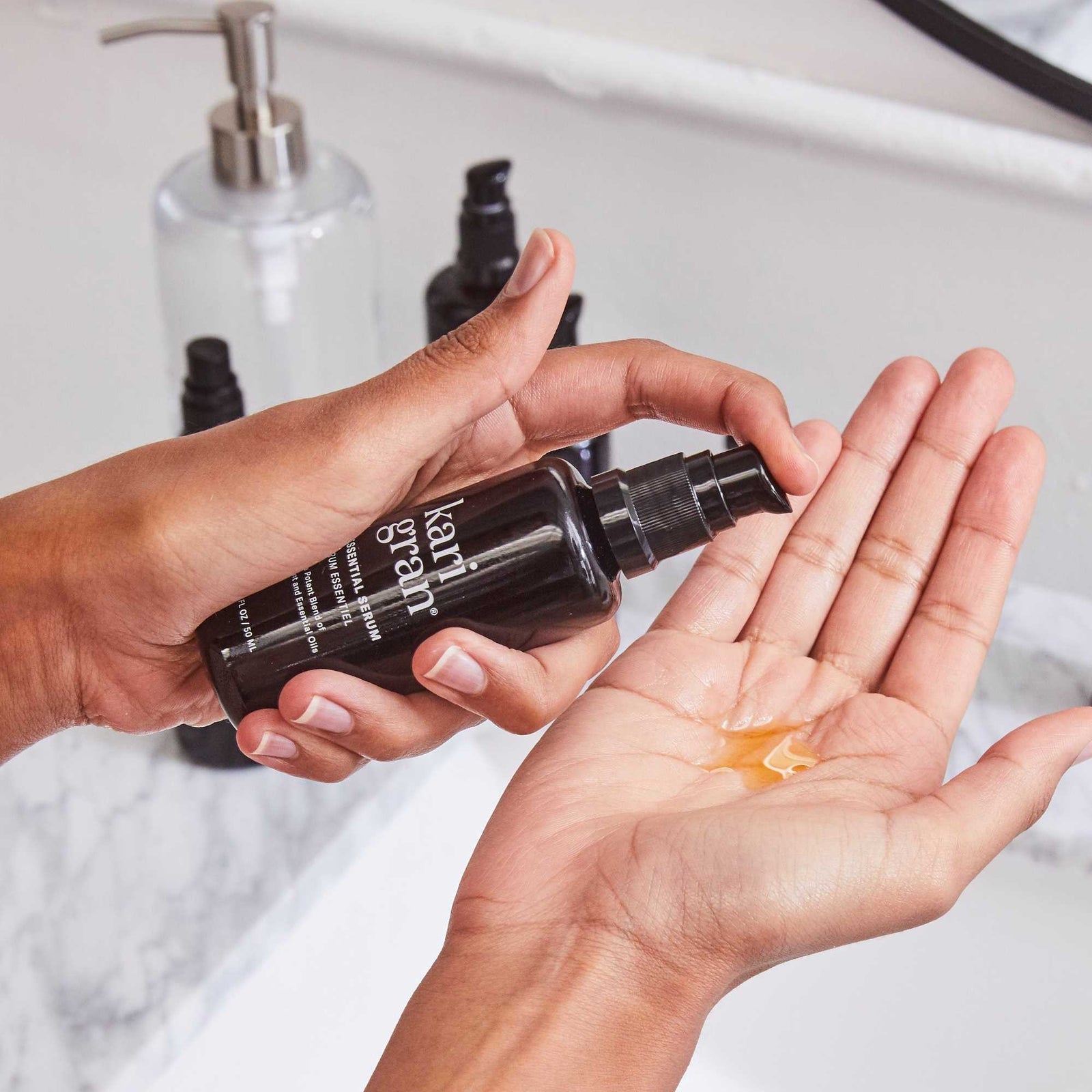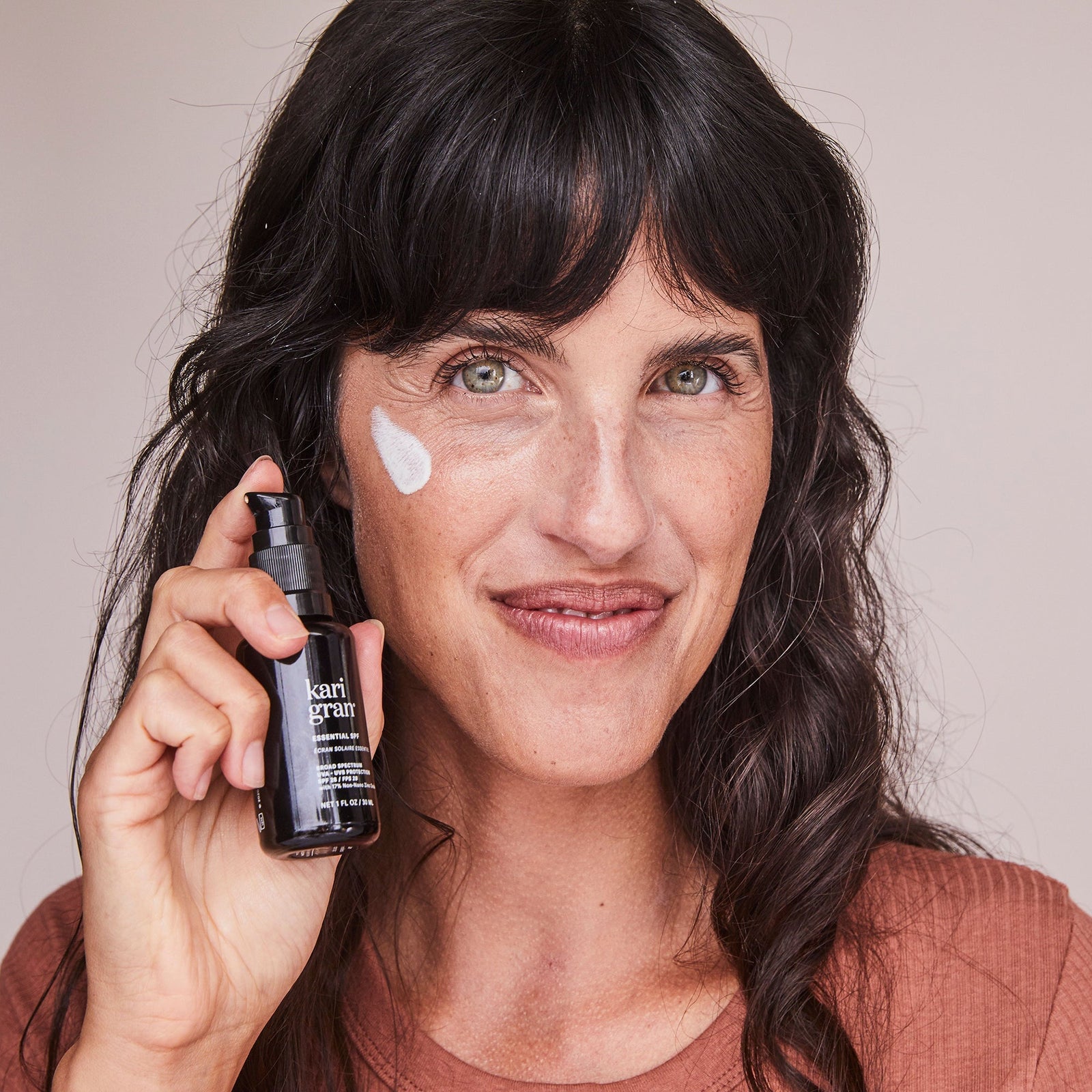Oils Vs. Creams in Skincare, Which Is Best?

Have you discovered Ageist yet? It’s a digital publication designed to “shine a light on a new mindset and way of living” for the over-50 crowd. It’s fresh, empowering, and immensely fun.
Ageist and its founder, David Stewart, have captivated Lisa and Kari for some time. Both are inspired by his immense curiosity, and his emphasis on finding your purpose over passion to help others.
So, when David asked to talk to Kari about oil-based skincare, clean beauty, and how Kari came to be a believer. She was delighted to jump right in. Cue the conversation!
David: Why is oil-based better than water-based?
Kari: For me, it’s simple. Most lotions and creams are actually 60-80% water (or filler), which means you get less of the “good stuff.” A good example of literally being “watered down.” As I got older, I discovered that the lotions or creams I was using made my skin feel nice initially, but that only lasted about 10 minutes, and then I was back to square one with dry skin. The moisture wasn’t sinking in the way I needed. That changed once I started using quality oils on my skin. In fact, I knew oils were for me when they passed the overnight test, and I still felt hydrated when I woke up!
David: Why are some oils better than others?
Kari: Many skin-healthy oils contain high amounts of essential fatty acids. These EFA’s, as we call them, are essential building blocks of a healthy skin barrier. Many people might not be aware of the term skin barrier, but it plays a key role in having calm, smooth, hydrated skin. Hello glow! Two EFA’s I love are Rosehip oil, high in vitamin A, aka nature’s retinol, and absorbs quickly and another is avocado oil, which is rich in plant sterols and is super moisturizing on the skin.
David: Why do some oils feel greasy and don’t absorb well?
Kari: “Dry” oils have a smaller molecular structure, making them fast absorbing. A great example of this is Rosehip oil. Castor oil on the other hand, “sits” on the skin a bit longer because it has a pretty big molecular structure. It can have a greasier feeling and takes a very long time to absorb. This is why I love castor in our cleansing oil; it has a great slip under your fingers, and you can do a wonderful facial massage with it. But it’s not the right ingredient our tonics or serums.
David: Will my skin freak out if I use an oil?
Kari: Most likely no, but not all oils are created equal. I grew up in the generation that was conditioned to fear oil. Oil causes breakouts was the prevailing message then; it may be why so many of us thought we had to scrub our faces clean, which stripped skin of the healthy oils it needs. Remember that talk about molecular structure? Mineral oil and petroleum/petrolatum are prime examples of oils with some really big molecules. Think Vaseline and baby oil. These fall into the “occlusive” category — they form a barrier on your skin’s surface blocking air, water or anything else from getting in or out. It is like smothering your skin in plastic wrap. A healthy skin barrier needs to breathe.
David: Using oil on my skin sounds scary, but it works great. What are some of the other myths around oil?
Kari: That oil will make me break out. Remember, it is all about what type of oil you’re putting on your skin. Another thing to note: because an oil-based product is very concentrated, a little goes a very long way. If you’re considering trying an oil-based routine, maybe start with just one half of your face and then continue to use the products you have on the other. This is the one true way to test how a new routine will work for you. I wish I could take credit for this suggestion, however, my dermatologist told me this about 25 years ago!
David: Do you have to use preservatives with oil?
Kari: Generally, the shelf life of an oil can be extended with the addition of an antioxidant like vitamin E. Oils have the potential to oxidize (go rancid) when exposed to light and air. The perfect example of this is if you store a beautiful bottle of olive oil in clear glass on a sunny windowsill, it will go bad quickly. Since I chose to formulate with oils, I made sure we stored them in dark glass that would help protect from light and air oxidization. Every bottle is small-batch produced and marked with an expiration date.
David: What is the history of people using oil? I have an image of Cleopatra…
Kari: Well, you aren’t wrong! There’s actual archaeological evidence that the use of oils like castor and sesame were being used by ancient Egyptians. Romans used almond oil and later in Italy a group of Dominican monks at Santa Maria Novella (established in the 1200s) blended an oil with avocado and macadamia oils. And of course, olive oil has long been used in Italy and Greece. Women in other parts of the world have long known the secret of using oils in their skincare rituals; we’re just new to the party.
That just about wraps this session up. Please do take a moment to check out Ageist. Something is sure to captivate you too.
Leave a comment
Comments will be approved before showing up.



